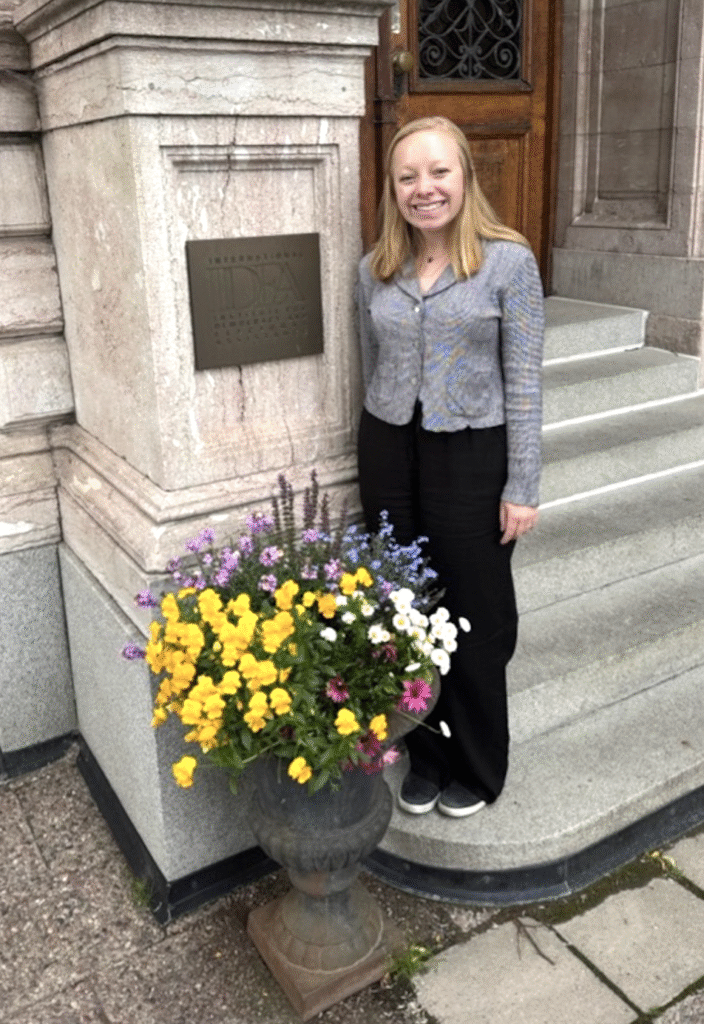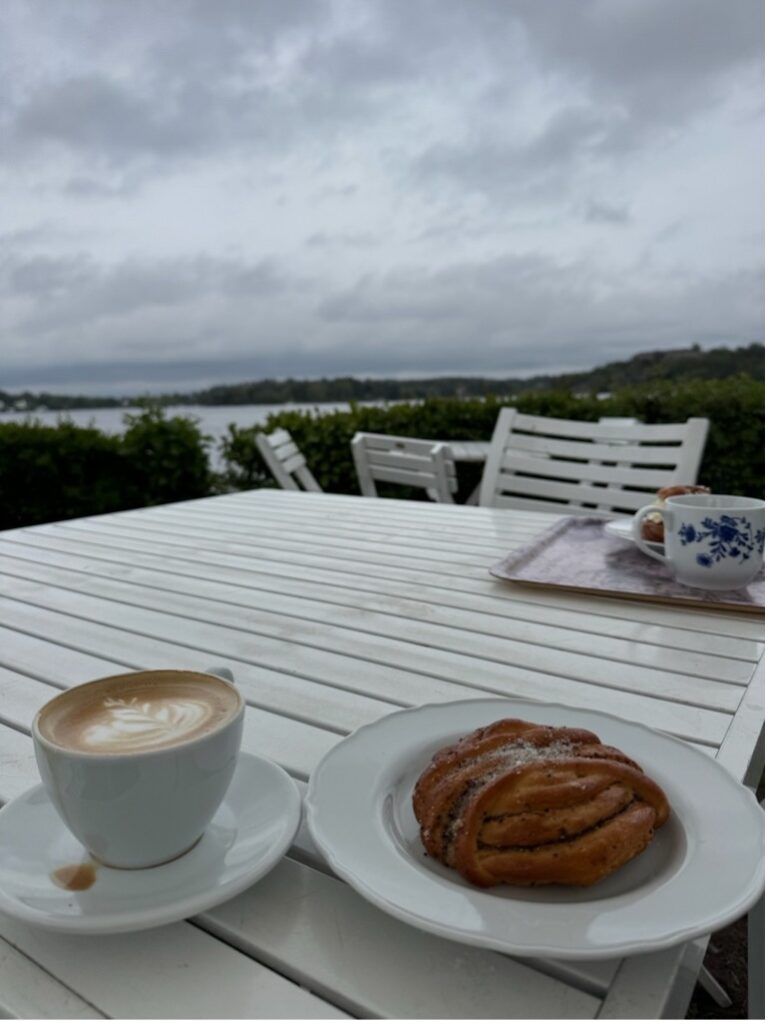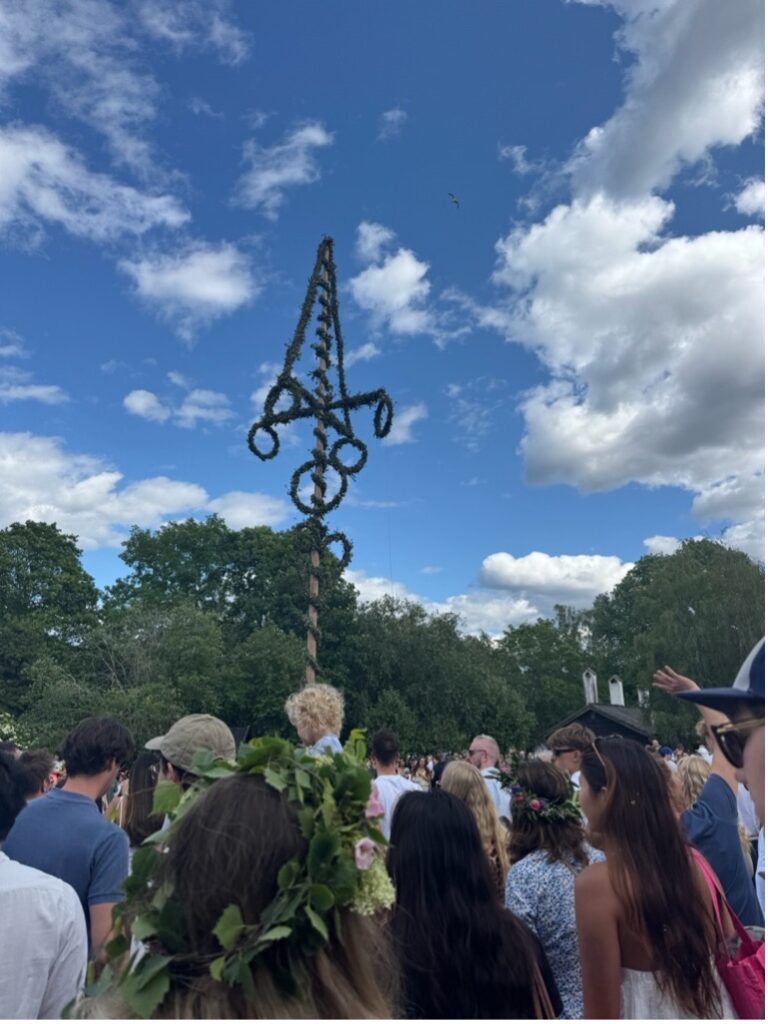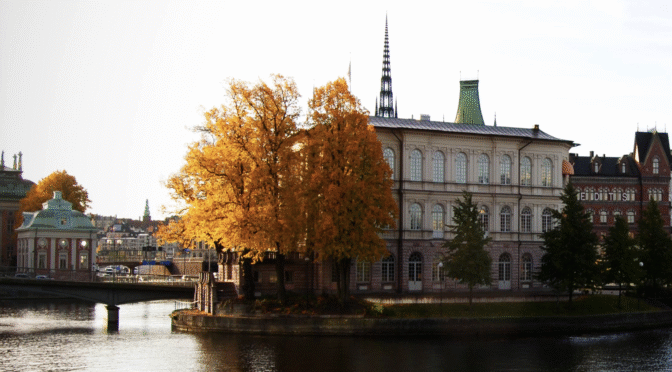By Grace Morris, PhD candidate in the UT Government Department
My time at the Institute for Democracy and Electoral Assistance (International IDEA) in their headquarters in Stockholm, Sweden has been an enriching experience both professionally and personally on my path to pursuing my doctorate in Government at The University of Texas at Austin. From the moment I stepped into the Stockholm office on my first Monday morning of work, the warmth from my new colleagues resonated and it already felt like a place I could call home.
While I had been to Stockholm a couple of times before, I had never truly lived in the city and interacted daily with Swedish culture. I quickly had to adapt to the Swedish keyboard at work, watch out for the sea of bikers during rush hour traffic, and learn to appreciate when the sun was shining. Stockholm is a city made up of a bunch of small islands, and International IDEA’s headquarters is located on its own island—Strömsborgsbron. With the city landscape, I quickly adapted to walking over a lot of bridges, enjoying being by the water, and hiking up some very steep hills.

One of my favorite Swedish traditions to take part in is fika—the practice of drinking coffee and eating a pastry with friends. Traditional Swedes will fika in both the morning and afternoon—something I could definitely get used to.

In addition, I was fortunate to celebrate the Midsummer holiday festivities in traditional Swedish fashion. This included dancing and singing around the Maypole, eating lots of strawberries, and laying around in the sun (yes, the sun luckily came out that weekend!). While the International IDEA office is quite international, there are a few native Swedes in the office who graciously invited some of us to join their traditional celebration on Midsummer eve.

International IDEA is an inter-governmental organization that focuses on democratic assessment and electoral performance globally. At the headquarters, there are multiple teams working on various aspects of their main mission. I have been a part of the Democracy Assessment team, tracking democracy across the globe along various indices of democratic performance. The team does tremendous work to track democratic events monthly across the world, noting how they affect that country’s overall democratic performance. Ultimately, their work helps inform policymakers, researchers, and civil society organizations from an objective, nonpartisan lens.
In my own research, I study migration and electoral politics—specifically at the intersection when migrants are provided with participatory rights. Therefore, my knowledge was essential to supporting my colleagues’ work on their annual Global State of Democracy (GSoD) Report. Quickly after starting the internship, I was put to the task of reviewing each line of the report for both quality of the content and data accuracy. I took a deep dive into International IDEA’s methodology, tracker of democracy, and ways of measuring democracy’s improvements and declines during 2024 and over the past five years.
Additionally, I supported the development of datasets that track overseas voting for individuals living outside their country of residence. These datasets cover countries across the globe and whether they have out of country voting, the method of voting, and the election type over time. Moreover, we also collected the voter turnout from abroad in recent elections. All this information was utilized in the final version of the GSoD report, currently in the publication process. Being able to take part in the end-to-end process of drafting and editing this essential annual report on the state of democracy globally was both rewarding and illuminating. I learned the difficulties of including such a large-scale topic, with a global perspective, into one readable document for a wide-ranging audience.
In addition to working on multiple iterations of the GSoD annual report, I also worked on multiple country profiles. Along with the Europe team, I supported drafting Norway and Finland’s political status over the last year, and what policymakers and researchers should watch out for in the coming year. I also jumped into weekly team meetings where we discussed a wide range of topics with regards to a variety of topics: the effects of banning political parties, the concept of citizenship across borders, and the status of our current political era.
Since I provided the team with a fresh perspective on how they market their data, I also took part in revamping their democracy tracker homepage and data methodology. These efforts seek to streamline the process of getting International IDEA’s research into the hands of more policymakers that can utilize their findings in their own work to attend to ongoing issues and equip themselves for those potentially upcoming.
Alongside the internship, I was able to conduct my own personal research and get to know the context for my future work. Since Sweden was one of the first countries to provide local-level voting rights for migrants, understanding the culture and politics has equipped me with the necessary tools to conduct more nuanced and pertinent research. For instance, last week I interviewed a Stockholm City Council member to gain insight into their immigrant voter population. During my time in Europe, I was also able to travel to Konstanz, Germany to present an original research paper with a fellow Ph.D. student at the Comparative Agendas Project annual conference. Outside of work, I joined my neighborhood yoga studio to find a sense of calm within an unfamiliar place.
Working at International IDEA in Stockholm has pushed me intellectually and professionally. After my initial work products, my supervisors saw great value in my work and gave me additional projects that I could not even finish by the end of the internship! Along the way, I met wonderful people at the office and in the city who broadened my perspectives and challenged my current understanding of the world around me. I hope to come back to Stockholm in the future, as it already feels like home away from home.
